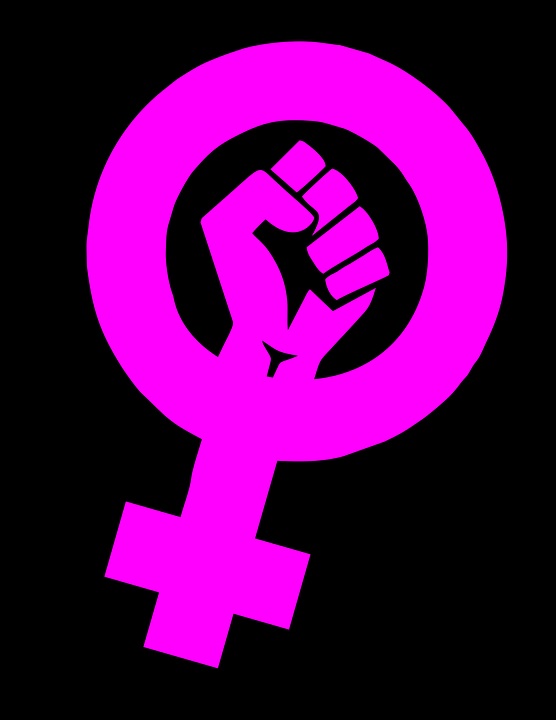Katie Roche's Blog
This International Women’s Day, Let’s Talk About Gender-Critical Feminism

Today is international women’s day. A day about celebrating women’s lives and achievements. So today, I thought I’d write about gender-critical feminism. If you’re involved with feminism or left-wing causes, you’ll hear all sorts of things about “evil TERFs” (Trans-exclusionary Radical Feminists) and SWERFs (Sex Worker Exclusionary Radical Feminists). Most of which are total rubbish. So here’s some myths and facts about gender-critical feminism.
In truth, we care about all issues relating to women’s equality. Our views are informed by Marxist or socialist economics. We are pro-choice, pro-gay rights, and against traditional gender roles. The overarching difference between liberal feminism and gender-critical feminism is that gender-critical feminists are prepared to stand up for things that are right, but not necessarily popular. We stick to our principles, even when it makes people unhappy. Where we disagree with mainstream feminists is on include:
Transgenderism:
This is what most people think of when they hear the phrase “gender critical feminism”. However, gender-critical feminists do not hate transgender people. I admit, there are some people who call themselves gender critical feminists, who actually are transphobic. But those are a minority and they don’t truly represent gender critical values. Most of us would never condone harming a transgender person who wasn’t harming someone else. Nor would I agree with a transgender person being discriminated against on the basis of them being transgender. For instance, a landlord refusing to let a flat to a transgender person (assuming the flat is self-contained), or refusing to give someone a job because they are transgender (assuming that the job doesn’t require the person to be a certain sex).
In fact, most gender-critical feminist’s views are largely in line with those of the general public. (I’m British, so I’m going to be talking about the British public here).
A YouGov study on transgender rights found that the British public actually aren’t hugely pro-transgender. For instance, when it came to legally changing sex, only people aged 18 to 24 and Labour voters said it should be easier to change legal sex. No group agreed that it should be possible to change legal gender without their doctors approval or that transgender people shouldn’t have to prove they’ve been living in their chosen sex for two years. In addition, no group also thought that transgender women should be allowed to compete in women’s sports. Furthermore, the majority of British people don’t think that people who haven’t undergone gender reassignment surgery should use their chosen toilets or changing rooms. These all align with what most gender critical feminists think.
Sex work:
We are against the notion that sex work is liberating for women. However, we are not “sex worker exclusionary”. On the contrary, we want to help sex workers. Now, sex work is such a broad term. It includes a student with an OnlyFans account, or an exotic dancer, or a drug addict who is pimped out by her dealer. Some women make a lot of money. Others make very little. But one thing that’s true of all forms of sex work is that they commodify a woman’s body. Furthermore, prostitution is dangerous. The more people a woman has sex with, the more at risk she is for STIs. Even if she uses protection. No protection is 100% perfect. In addition, sex workers are at high risk of violence and sexual assault.
The other favourite argument made by mainstream feminists is that sex work is just like any other line of work. Nobody wants to work. And all jobs carry health risks, so sex work is like any other service industry job. As I wrote in my book, IDiots, the most dangerous official job in the USA is logging. As of 2015, loggers had a mortality rate of 132.7 per 100,000 workers. But prostitutes have a mortality rate of 459 per 100,000. That means prostitution is more dangerous than any other “dangerous” job.
Furthermore, in the UK and many other jurisdictions, jobseekers are required to take any work available. If prostitution were seen as just another job, more women would be forced into sex work. Imagine this- you’re on Universal Credit (the UK’s main income replacement benefit), seeking work, and your work coach suggests becoming a prostitute. Would that really be okay? Even worse, imagine if your benefits stopped because you wouldn’t consider prostitution as a career? Gender-critical feminists want to protect other women from sex work. Women should never be in a position where they have no choice but to become sex workers.
Beauty:
The beauty industry promotes the idea that women’s worth is based on their appearance. Blemishes and imperfections that are acceptable for men are seen as disgusting on women. Meanwhile, a woman’s other qualities, such as her intelligence or her work ethic are overlooked. The industry also benefits men, who own most beauty companies. It exploits women financially too.
Contrary to what liberal feminists assert, make-up is not empowering. Women shouldn’t need make-up and cosmetics to “feel more confident”. This too is something largely promoted by the beauty industry to sell their products. The industry has appropriated feminism, along with other socially liberal concepts such as self-care.
Fertility industry:
While infertility causes great emotional pain to many women, the fertility industry has also harmed many women. Surrogacy is particularly problematic. Like prostitution, these commodify women’s bodies. Many people carry a baby for family and friends, which isn’t such a big problem. But surrogacy involving strangers is worrying. In effect, a person is renting the use of a woman’s uterus. The worst case is “straight” surrogacy, where the baby is conceived using the surrogate’s eggs and she carries the baby. She is basically forced to sell her baby.
As well, surrogacy carries many physical and psychological risks. First, many women unexpectedly find giving up the baby very difficult. Women seem to bond with the baby. I don’t know if this because of hormones released during labour, or if women simply bond with the baby over the 9 months of carrying it. Especially when it’s genetically their child. They can experience trauma for many years afterwards. There are many risks to physical health too. People forget how dangerous having a baby is. Women die, are left with injuries, incontinence and internal scarring as a consequence of childbirth.
But what is especially worrying is the case of women from impoverished countries being surrogates. The child they carried and in some cases, is biologically their child, is hundreds or thousands of miles away. And she has fewer options for making money than women from western countries do. As well, she is more likely to struggle to access healthcare, increasing the risk of her suffering serious complications during or after the birth.
More alarmingly, couples don’t always want the children they have paid to create. Remember the case of baby Gammy. Gammy had Down Syndrome. A Thai woman carried him and his twin sister for an Australian couple. When it was discovered the foetus had Down Syndrome, the couple demanded he be aborted. The woman refused. The Australian couple who he was being carried for abandoned him, leaving his surrogate mother to care for him.
Hard as it might be to accept, having a baby is not a right. Not for gay couples. Or for infertile women. Furthermore, there are plenty of babies and children available for fostering or adoption. I know people don’t like to hear this. And adopting a baby is not the same as giving birth to one. But you are giving a loving home to a child who desperately needs one.
Admittedly, adoption can be expensive and time consuming. And many agencies have prohibitively high standards. It should be much easier and cheaper to adopt a child. A family doesn’t need to be “perfect” to raise a child. But the system pushes people into fertility treatments they might not have wanted.
Another argument is that infertile people shouldn’t be burdened with caring for unwanted children. It’s true that many children who are put up for adoption are disabled or experience attachment difficulties. But bear in mind that prior to the development of assisted reproductive technologies, it did fall to infertile couples to care for these children. As well, your own child could have been born with an illness or disability. Many children become sick as they grow up. Your child could be in an accident that leaves them disabled. So, having a child through surrogacy or any other method doesn’t guarantee the child will be healthy.
So there we have it. The basics of gender-critical feminism. The reality is, we’re not evil. We’re just regular women, standing up for other women. Sometimes we’re controversial, but we always mean well.
See previous post
See next post
See older posts
If you enjoyed this article, please consider making a donation to support the site.






